Be Wary of "Experts"
On July 14, 2015 Stav Atir published a study that demonstrated how know-it-all douchebags — from marketing specialists, organic proponents and get-rich-fast schemers are actually more likely to fall for for made up bullshit facts themselves. Yeap, the biggest "experts" seem to get easily played and believe grandiose bullshit to begin with.
"Overclaiming" as it came to be known, is the false perception of people that seem to believe how the world works and how much they know about it. For example, someone might attend a couple of motivational speaking groups, get a college degree and work for a high-tier company and immediately believe that knowledge has magically landed upon them. As Bernard Russel discovered decades ago:
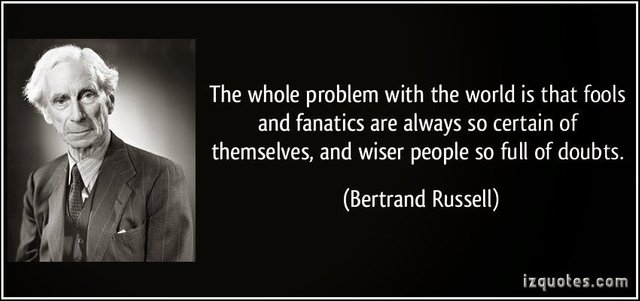
The study even demonstrated that this also evident in scientific fields such as biology where skepticism and humbleness should triumph. Even if participants in the studies were warned that some concepts were fictitious it did not reduce the overclaiming effect..
What this implies is that humans are easily caught up in their own whirl of limited perception. The focus in seeing the world through a narrow lens in their focus area due to how the world functions in regards to specialization. This disables them from stepping back and looking at the larger picture. More so, the nature of our economic system has individuals categorized based on their area of specialization. This creates an unlikely conundrum since people start comparing their knowledge to those around them instead of being able to reflect outside of their realm. Now don't take this study at hard because after all, it was produced from "experts". Hear me out though;
Wonder why bullshit inquiries like homeopathy, astrology, acupuncture, heck even astronomy, psychology and economics seem to be valued and perceived as 'sciences' that help us understand the world? What matters is not the bogus correlations that they are able to come up with. Rather, what really matters, is how well defended their claims are when it comes to real world applications. If enough "experts" support that the correlations hold then the masses follow.
People pop-up homeopathic pills (plain water) and believe in the whole thing because "experts" reassure them of the positive effects in at least 33% of the cases. They neglect though to include that, given enough time, the body self-heals most illnesses and that 33% is more or less the result of a placebo. Astrology does much the same. "Soon you will travel and meet someone that will change your life. Be wary though because a surprise visit might change things". Although there is an obvious "no-shit-Sherlock" element, as well as the power of suggestion roaming rampant in such a statement, people believe the "expert" in the field. They don't argue whether the "expert's" knowledge about the future based on astrology is valid but rather debate whether the knowledge is more valid in comparison to another "expert". Everybody forgets that the entire enquiry is based on thin air of "experts" that phenomenally jerking each other off in order to create an air of credibility in the field which they are making bank.
Psychology does much the same with "disorders". Nobody bothers to dismiss them completely. The point is always which "expert" is closer to the "answer". Which can it "help me"?. People got used of popping pills and having paid friends. The market is there. Psychology gains validity from people's needs. If enough people want a solution then the field investigating it, gains credibility because more and more people clump up and "experts" arise (even if its all bullshit).
Economists do much the same when it comes to economic policies. Everything changes so rapidly around us. Every economy is extremely fluid, fragile and unique on and in itself but they still insist that what worked before will work in the future. The "experts" fight to get their point across in order to push economic policies but we forget that it doesn't matter what they chose. If it works then the economist was right and everything worked according to plan. If it doesn't work then ...something else went wrong.
When an expert uses a post-hoc narrative aka explaining shit AFTER they occurred then you need to understand that they are "expert bullshiters", before they are anything else. This is why you see politicians or motivational speakers speak generically. Example: "There is nothing the mind can't accomplish if we put ourselves into it, but we have to careful with those around us". If everything goes well and you become successful then "fuck yeah, Tony called it bro, he is so legit, buy the book bro". If it doesn't "darn it, Tony warned me bro, I didn't listen, maybe I should read the other books". Tony, the "expert" is right no matter what morons end up believing. Most people luck basic critical thinking skills anyways.
I have yet to see a single "expert" predict in great detail something BEFORE it happened, explaining why and how it would happen. When it happens it is always a result of rigorous observation and careful experimentation. (And yes lucky calls count as much as lottery predictions). Expertise and experiment come from the same latin word 'expertus', which is the past participle of experiri ‘try’. This is how we also get "experience" and "experiment". Most "experts" have not tried over and over again like science dictates for experimentation. They merely propagate non-sense — hence the importance of replicability and falsifiability in the fields. No matter how much you love a field of "science" if your experiment has no replicability or falsifiability then it is mostly bullshit much like any kind of pseudoscience. Call it "soft science" heck, call it "jello science" if you want. It is still boloney. Unfortunately, most "experts" build their entire careers on nonsense since peer-review credibility and amount of publications seem to be valued more than replicability — aka confirming actual expertise.
As far as I can remember I always turned away from people that are either too popular or make extravagant claims about the world. I use it as a rule of thumb. If a group of people does X because they believe the "expert" that propagates it, I do the exact opposite. This has allowed me to get amazing financial rewards throughout the years and helped me to understand the world much better. "Expertise" is much like a bubble in the market. When too many people start claiming they know shit and more and more people get into it, then you know is time to back off. You know that is all over amplified hot air with no substance — hence the inevitable collapse
When I see people getting into STEM because science has become "cool" then I know I should be wary of the studies from newly "experts". When I see people popping pills for newly discovered "disorders" then I know that there is a lot of bullshit support from "experts". When I see everyone getting a house because "American dream fuck yeah" then I am wary of the economic "experts". When I see "everyone should get an education because education fuck yeah" while the student debt piles up, then I know that the "experts" are coning people either willingly or unwillingly into a hot air meme that is about to blow up.
Paying attention to the clustering of "experts" will make you understand the world better rather than following their findings. The world is not run by experts but rather the shadow of expertise.
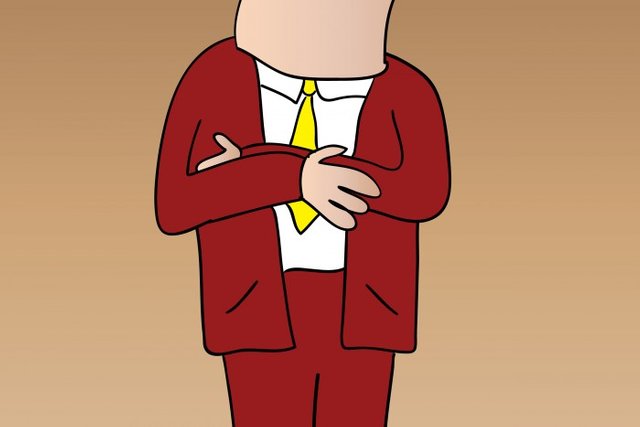
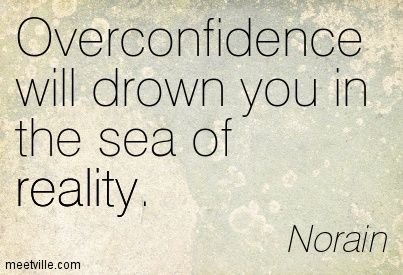
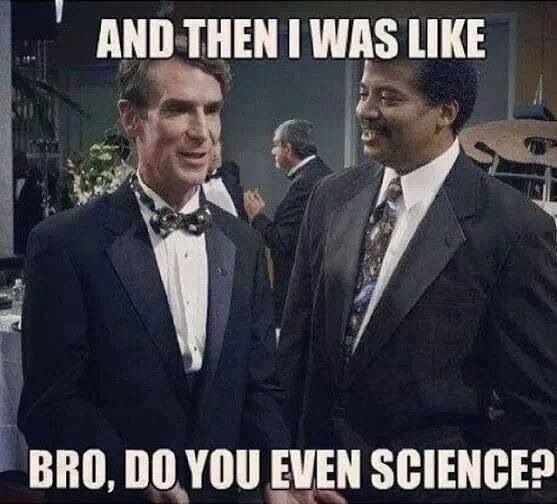
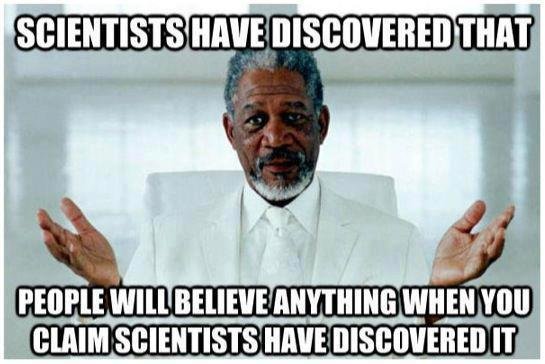
The issue is with the loosening of the definition of the word expert. Should one trust the statements of someone who has dedicated their lives to studying a topic of interest and has a deep and varried knowledge base, on that issue that they studied? Yes, they should, because the expert very likely understands the issue better then them. However if that person is just a self claimed expert, with no illustration of their claimed expertise then people are best to be skeptical.
It's a bit more complicated an issue then you make it seem to be frank. Posts like this while well intentioned, end up doing more harm then good as people take them at face value and end up leaving with the idea "trust no expert, knowledge doesn't matter" even when the article was written entirely to the contrary.
So you are saying that I should take advice from an expert astrologer because they have dedicated their lives on their subject?
And how can you possibly verify that. (+ see my point above)
Knowledge does matter. I mentioned very specifically what "expertise" entails and it has to do with falsifiability in experiments and replicability. Most of "science" is bullshit, whether we like it or not because the majority has become a meme for "education" with no actual emphasis to rigorous scientific investigation.
Yes, on the subject of astrology. Which you should know is stupid and not be interested in from the outset. However if you were interested then their years of study would be valuable. Despite the fact that the field is hog wash.
Accomplishments in the field of supposed expertise.
Nonsense, now your just putting your ignorance on display.
http://www.slate.com/articles/health_and_science/future_tense/2016/04/biomedicine_facing_a_worse_replication_crisis_than_the_one_plaguing_psychology.html
Like I said. "Mostly" Bullshit
Mmm hmm. Okay kyriacos, what ever you say ;)
I wish it wasn't. Perhaps more than you.
In case you prefer the more "digestible" version
http://www.bbc.com/news/science-environment-39054778
Again, I work in the field, I know the issues. Thanks.
so what? my statement stands. Most of it IS bullshit because there is no replicability. Doesn't matter if you work on the field as much as it doesn't matter if a fortune letter spend a lifetime interpreting coffee stains from cups. You said "Nonsense, now your just putting your ignorance on display."
obviously you are the one who is ignorant or rather trying to scoop the issue under the carpet. I am allergic to senseless science cheerleading as much as I am with pseudoscience.
Most of the work hasn't been attempted to be reproduced. Those statistics are skewed by really high profile flashy "high impact" publications. There are reproducibility issues, but you must also keep in mind those stats are created by polling a specific subset of scientists.
I have yet to be unable to reproduce ANY experiment that I have tried from the literature. Everything has been appropriate.
The majority of it is not bullshit. Some of it is, exactly how much isn't known. Certainly not a majority.
Can't take your word mate, nor your specific field. Evidence shows otherwise.
I can say the same about psychology. I can say that about anything. You know "it's stupid man".
Bogus accomplishments and self-honoring don't make the field valid. anyone can come up with a field and crown themselves experts in it. The field doesn't make the person's findings valid.
I would suggest you do your research before you comment in my posts.
https://en.wikipedia.org/wiki/Replication_crisis
You can't say it about psychology because psychology explains things that happen. Astrology attempts to create a causal relationship between two unrelated things. So that's a poor example.
No self honor isn't a justification, that's not an accomplishment, however actually advancing a field in a measurable way is. Your just skirting around the issue.
I'm well aware of the reproducibility issues in science publication. This doesn't make your statements any more true.
Perhaps you should focus on writing a better post then throwing shade at me.
Still not more true buddy. :)
Psychology uses causal relationship between two or more unrelated things all the time. That's how the narrative is created. Actually, to step this up a bit I dare you to bring a study of your choice to I can demonstrate this to you.
How can you tell if a field is even valid? Why have a "field" anyways when there is so much trash all over it, overshadowing actual research (aka neurobiology vs bullshit psychology)
Actually it does because so far we know that most are not replicable and in my dictionary. no replicability = snake oil.
my post is good enough. I have yet to see a valid counter argument. I am well aware of the opposing arguments. This is why it is so easy for me to bring evidence to the table. I am very careful with that I write and almost always I can anticipate the "classic" response.
I was in academia for some time in case you didn't know.
For me it's like being the lecturer and giving speeches about business although I didn't have any myself. People just consume and repeat without thinking. I don't know how it was around the world but years ago in Poland every "expert" was telling that eggs are unhealthy and they rising your cholesterol and you'll certainly will die because of heart disease. They were telling that you can eat only 1-2 eggs per mounth max. Everybody was spreading this "advice" and "worning". Then new research has proven that eggs are actually very beneficial so everybody started telling to eats eggs. Same was with butter and margarine...
Don't worry, the "science cheerleaders" of today for most things will look as silly as this advertisement. The proclaims GMO safety for example when there are no actual epigenetic effects observed for at least 2 human generations. Sure, feed the people and it is an awesome technology, i would take it over hunger, but for fucks sake, don't rush to call it "safe".
Guess who else found this the hard way
And all that just for some of it
Ps. I don't think monay is something bad bat the greed and constant pursuit of it definitely
https://steemit.com/steemit/@misterbitcoin/upvote-steem-world-helping-each-other-with-your-upvote-3
This exact phrase is one of the problems when used incorrectly. Research doesn't really prove, it suggests. Especially a single study. A single study especially when studying humans proves virtually nothing as the sample sizes are usually insufficient and methodologies are often questionable since you can't easily remove additional factors to demonstrate correlation or causation with certainty. Something can be viewed as proven only after it has been substantiated by piles (technical term) of studies with varying methodologies and so on. It surely doesn't happen overnight.
Generally speaking, real experts are cautious about making big claims with absolute certainty just list Bertrand Russel noticed.
I like it. Ya, it's like the constant pressure of people wanting to come across as experts will be louder and more visible than actual expertise.
Decentralized systems will in time alleviate this, I'd hope. Eventually people realize the limitations of "experts" and stop expecting a handful of people to guide the world correctly.
Interesting, and makes sense. They probably don't consciously realize what they're doing, so they believe other people in the same way they believe themselves.
now you are saying something. Indeed, much like "ebay reputation" what works will rise above in a matter of public consensus and not of bullshit from a small circle of peer reviews.
I see this happens in medicine a lot. "The doctor said so". Even if the doctor hasn't updated his knowledge since his college years 20 years ago, even if he confuses "no evidence of disease" as "evidence of no disease", or even if he is a very good doctor, but of an entirely different specialization. A doctor is a human being that can be wrong too! I have also noticed that many doctors get used to this appeal to authority thing and this reinforces their confidence that their knowledge up to that point is really all they need. A good doctor should say "I'm not sure" or "I don't know", but then society does not consider him/her a good doctor.
This happens with other professions as well. People don't like to hear that their expert was wrong about something or doesn't know something. We don't like uncertainty. By the way, in cross-cultural studies uncertainty avoidance has been linked with country/culture. I know its too overgeneralized as a concept but it would be interesting to see if and how that behavior applies in different societies, ie. whether a culture reinforces the "expertise" trend or the "overclaiming" effect more than another.
Yeap. Medicine is not even science. More like an art that is based sometimes on scientific evidence.
Great article, and I totally agree. If anything, you didn't go far enough. For the last 15 years I have been awakening to the mountain of lies we were taught as children. The older I get, and the deeper I dig, the worse it gets. When I get some free time to publish more posts on Steemit, I will be tearing apart many of these lies limb from limb, so stay tuned and follow me.
I will make another detailed post about this topic. more technical just to demonstrate how messed the scientific scene is.
You just don't see enough Bertrand Russell quotes these days.
It's true that the confirmation bias produced by an overzealous horde of lemmings is a reliable indicator of the path of least preference. At least, it's worked for me for a long time.
much of science has ended up being like Russel's teapot. Religion as well.
Is it any wonder? Proof denies faith, but costs more effort and often incurs ridicule or alienation, or both. Such is the burden of proof. Ever began a reply to a simplistic postulation or moronic deduction with "It's not quite that simple..." only to be cut short by denigration intended to marginalise?
How many straw men have you fought. A lot, I wager.
Text book, bible, both have totemic power to dismiss & defeat with a mere mention; It is written. I still prefer the endeavor, the argument, the explanation & the journey, it gives me a richer inner world & a more insightful, meaningful dialogue with reality, however limited it may ultimately be, whatever that costs me. I just wish that contest wasn't favoured over collaboration so frequently.
Well I guess Im not an expert then as I agree with almost no body.
These days, one can't even tell if the "Expert" themselves are ignorant or just have a vested interest to mislead the public
@kyriacos Smarter than thou assholes will always exist. The main problem is fishing them out earlier so that they don't end up misleading the gullible.
I dunno. Maybe the best we can hope for is not to be gullible ourselves.
There seems to be a significant portion of humanity that craves being followers. I know of no way to help them as won't help themselves.
So true! Everyone needs to learn to become the expert themselves!
John Rose just made a video about this. Check out his youtube channel and test an idea as time has come!! Namaste :)